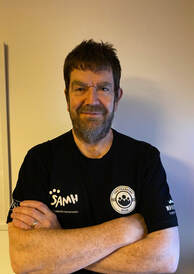 RPA and the United Nations of Sound Remember Britpop, when Oasis ruled rock and were courted by air-guitar playing Britprimeministers? The Verve were lumped into this scene because they were northern English and Noel Gallagher’s pals. But the Wigan alt-rockers were so far removed from Oasis’s riffs-by-numbers, let alone the Echobellys and Shed Sevens sharing HMVs ‘Britpop’ section, light would’ve taken millennia to travel between them. Their music could effortlessly fill stadia but was introspective and soul-searching, was sometimes overblown but always arresting. Third album ‘Urban Hymns’ was the fifth fastest-selling British album ever. Most importantly, in Richard Ashcroft they had one of rock’s most diverting front men. The Verve were so far removed from Oasis’s riffs-by-numbers, let alone the Shed Sevens sharing HMVs ‘Britpop’ section, light would’ve taken millennia to travel between them. His most recent project was RPA and the United Nations of Sound. And a fine album it was/is. For this radical departure from The Verve’s chart-friendly rock Ashcroft mustered suitably eclectic recruits. Renowned session guitarist Steve Wyreman. Bassist Paul DW Wright. Drummer Derrick Wright. String arranger Benjamin Wright (responsible for Michael Jackson’s ‘Off the Wall’). Engineer Reggie Dozier, a Motown veteran. And finally, producer No ID, a hip hop and RnB aficionado (aka the ‘The Godfather of Chicago hip hop’). The Verve’s scatological influences covered bases as diverse as Velvet Underground and My Bloody Valentine. But the absence of Nick McCabe’s crashing chords and psychedelic fretwork has created a much subtler soundscape. Where Ashcroft’s solo albums tended to be ballad-heavy and inwardly-focussed, ‘United Nations’ is a bold statement. The result is no ‘Urban Hymns 2’. It is far more forward-looking than that. As ever, Ashcroft’s unshakeable self-belief drives the 12 songs. And while the overall standard varies, the uplifting vibe is firmly established in opening track, ‘Are You Ready?’ The video for this six-minute belter, by respected film director Richard Jobson, features a revitalised Ashcroft, lean, athletic (demonstrating the nimble footwork that once put him on Wigan Athletic's books) and eager to face adversity after his former band’s inevitable implosion. Introducing No ID’s urban beats on ‘America’, Ashcroft lays down one of the album’s defining tenets: the unifying power of music. “In Tokyo, in London town, same pain, same joy, same sound”. Cut with dreamy spaghetti western interludes, the overall effect is pulsating and life-affirming. ‘Beatitudes’ is a thumping slice of hip-hop – with ‘Bitter Sweet Symphony’ strings replaced by urgent guitars. ‘How deep is your man’ exposes Ashcroft’s passion for American blues and gospel, a much more obvious channel for his soulful yearnings than some of The Verve’s spaced-out Floydian slips. ‘Royal Highness’ is driven by a familiar riff, reminiscent of the Velvet Underground’s ‘Sweet Jane’; but that’s the only connection between Ashcroft’s positivism and those prototype indie New Yorkers in their all-black garb - sunglasses to tourniquets. ‘Glory’, like many of the tracks, is steeped in spirituality, the religious overtone stripped to its purest sense to highlight the gulf between individual belief and organised bible-thumping, homophobic bile. ‘Life can be so beautiful’ takes a few listens to fully appreciate. But its luscious layers of strings over a trip-hop beat, and a soprano voice intoning ‘we’re just selfish genes’ eventually create an engaging hook. ‘Let my soul rest’ lifts the listener with a gorgeous refrain and is an apt closing track. You can picture thousands of Glastonbury lighters (and The Verve were always the antithesis of those acts lurking at the blander end of the indie stadium scale, like Snowplay or Cold Patrol, or whatever the fuck they’re called). But the track also bears all the hallmarks of Ashcroft’s introspection. Ashcroft is a driven performer who, at times, is so immersed in his music the result is practically shamanistic. The Sunday Times review of this album simply bemoaned it sounding nothing like ‘Bitter Sweet Symphony’. But that’s obviously a plus, just as 15 years ago The Verve weren’t remotely like Oasis or any of the other Britpop Byrds/Beatles tribute bands. Ashcroft will always have his detractors. His career he seen him cope with physical and mental exhaustion, band splits, near-fatal collapses during epic tours, and, inevitably, the negative effects of recreational drugs. But surviving this Agincourt-like barrage of slings and arrows has made him stronger. Cut-free from the The Verve's baggage, this album marks a spirited rebirth. Awash in RnB, hip-hop beats, Wyreman’s Hendrix-heavy funk guitar licks, strings and gospel choirs, it is an audacious step into new territory. At his creative best, Ashcroft is one of Britain’s most vital songwriters of recent decades. As he stated himself in an early interview: ‘If I can move a person emotionally and take them to another place, it would mean more to me than seeing us in the top 10'. Ashcroft is a driven performer who, at times is so immersed in his music the result is practically shamanistic. RPA and The United Nations of Sound is certainly Ashcroft taking his fans to another place. |
|

 RSS Feed
RSS Feed
